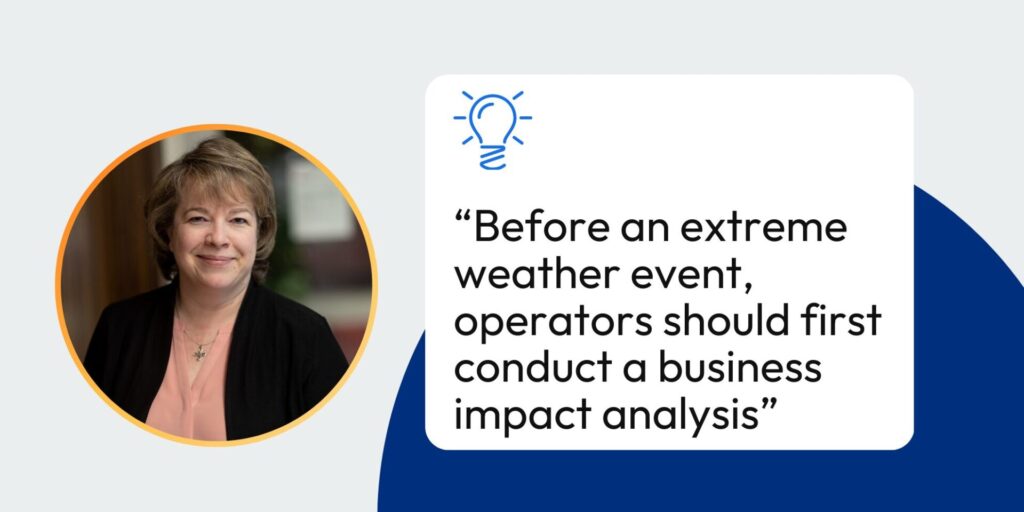In the wake of the devastating impact of Hurricane Helene, which made landfall as a Category 4 storm on September 26, FEA President and COO, Laurie Gilmer, provided invaluable expertise to a recent article featured in Facilities Dive. The article focuses on the challenges of disaster preparedness and recovery faced by facility managers and operators in the aftermath of catastrophic events like Helene. Through her contributions, Laurie offered crucial guidance on business continuity, risk management, and operational resilience.
Proactive Planning: The Importance of Conducting a Business Impact Analysis
One of the standout insights from Laurie Gilmer in the article is the emphasis on conducting a business impact analysis before any extreme weather event occurs. According to Gilmer, this process is foundational to creating an effective disaster preparedness strategy.
A business impact analysis helps organizations identify their most essential functions and determine the critical systems and resources required to maintain them during and after a disaster. Gilmer highlights that the first step in this analysis should be asking key questions: “What are the essential functions that we do in our business, and how do we make sure that they are preserved?” and “How are we going to get back to regular business? Are we responding in the moment, and how are we looking long-term?” By understanding these core business functions, operators can better prioritize recovery efforts and minimize downtime.
For Gilmer, the goal is to ensure that when a disaster strikes, the organization is not only able to respond immediately but can also resume normal operations as quickly as possible. This proactive approach significantly reduces the disruption caused by unexpected events.
Learn more about FEA’s business resilience planning services here.
Training and Exercises: Preparing Teams for the Unexpected
Beyond the technical aspects of planning, Laurie also stressed the importance of training and preparedness within teams. She advocates for a comprehensive approach to emergency and business response planning—one that goes beyond simply having a plan on paper. Gilmer points out that “if an emergency and business response plan is stuck on the shelf, then it’s really not going to help your team.” This is why regular training exercises, including tabletop exercises conducted at least once a year, are critical.
These exercises give teams the opportunity to walk through real-world scenarios and practice executing emergency procedures in a controlled environment. Gilmer argues that this type of training helps ensure that when disaster strikes, everyone involved is familiar with their roles, can communicate effectively, and can respond without hesitation.
By making disaster response an ongoing part of operations, businesses can create a culture of preparedness that empowers teams to act decisively in critical moments.
Managing Operations During Extended Disruptions
Another key point that Laurie Gilmer addresses is how organizations can continue their operations during extended periods of disruption. In the case of Hurricane Helene, many facilities were left severely damaged, and the inability to access certain sites delayed assessment and recovery efforts. This highlights the need for businesses to think beyond short-term fixes and plan for long-term recovery and continuity.
Gilmer urges operators to consider alternative sites and communication strategies in their preparedness plans. “Think of essential functions as being the top few things that you need for your business to survive. What can we get by with? What’s the absolute bare minimum we have to maintain, and then how soon do you need to get those essential functions back up and running?” This philosophy ensures that businesses can remain operational, even when their primary facility is unavailable.
Leveraging Technology and Partnerships for Effective Recovery
In addition to preparedness plans and training, Gilmer also advocates for leveraging technology and strategic partnerships to aid in recovery efforts. As the article notes, “time is of the essence in these situations,” and having the right technology in place—such as building automation systems—can provide real-time data to help operators assess damage and mobilize recovery teams quickly.
Gilmer also emphasizes the importance of working with partners such as the Federal Emergency Management Agency (FEMA) and the U.S. Army Corps of Engineers, especially in situations where access to impacted sites is restricted. By coordinating with these agencies, businesses can expedite the recovery process and ensure that all necessary resources are available when needed.
Learning from Disaster: Flexibility in Future Planning
While no amount of planning can fully prepare organizations for every disaster, Gilmer stresses the importance of learning from each event. Reflecting on the aftermath of Hurricane Helene, she highlights that “it is critical to learn from these events and build on existing plans, so that we are better prepared next time, and understand how to be flexible inside the situation.”
The lesson here is clear: disaster recovery is not static. Businesses must continuously adapt their plans, refine their strategies, and incorporate new insights gained from real-world events. Gilmer’s contributions serve as a timely reminder that the goal is not only to survive a disaster but to emerge stronger, more resilient, and better equipped for the challenges ahead.
Conclusion
Laurie Gilmer’s contributions to the Facilities Dive article on the importance of conducting a business impact analysis, disaster preparedness, and recovery in the wake of Hurricane Helene provide facility operators with practical, actionable advice for navigating extreme weather events and other catastrophic disruptions. Through her focus on proactive planning, team training, and the integration of technology and partnerships, Gilmer offers a roadmap for building resilient operations that can withstand even the most severe challenges.
As businesses across industries continue to face increasing threats from natural disasters, Gilmer’s expertise serves as an essential resource for ensuring that organizations are not only prepared but also empowered to recover quickly and effectively.




